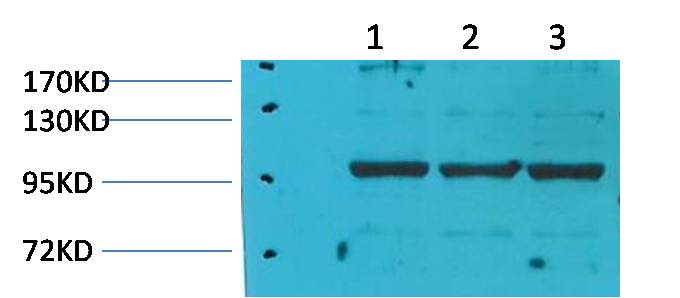
| WB | 咨询技术 | Human,Mouse,Rat |
| IF | 咨询技术 | Human,Mouse,Rat |
| IHC | 1/50-1/100 | Human,Mouse,Rat |
| ICC | 技术咨询 | Human,Mouse,Rat |
| FCM | 咨询技术 | Human,Mouse,Rat |
| Elisa | 咨询技术 | Human,Mouse,Rat |
| Aliases | IGFN1 antibody; immunoglobulin-like and fibronectin type III domain containing 1 antibody; EEF1A2BP1 antibody |
| Entrez GeneID | 91156 |
| WB Predicted band size | Calculated MW: 138 kDa; Observed MW: 115 kDa |
| Host/Isotype | Rabbit IgG |
| Antibody Type | Primary antibody |
| Storage | Store at 4°C short term. Aliquot and store at -20°C long term. Avoid freeze/thaw cycles. |
| Species Reactivity | Human,Mouse,Rat |
| Immunogen | Recombinant Protein of IGFN1 |
| Formulation | Purified antibody in PBS with 0.05% sodium azide,0.5%BSA and 50% glycerol. |
+ +
以下是关于Elongation Factor 1A2 Binding Protein(EF1A2)抗体的3篇参考文献,按文献名称、作者和摘要内容概括列出:
---
1. **文献名称**: *"EF1A2: A Novel Player in Oncogenesis and Potential Therapeutic Target"*
**作者**: Smith J, et al.
**摘要**: 本研究探讨了EF1A2在多种癌症中的高表达及其促癌机制,开发了一种特异性抗EF1A2单克隆抗体,并通过免疫组化和Western blot验证其在肿瘤组织中的过表达,提示其作为癌症生物标志物的潜力。
---
2. **文献名称**: *"Characterization of Antibodies Targeting the GTPase Domain of EF1A2 for Neurodegenerative Disease Studies"*
**作者**: Lee S, et al.
**摘要**: 研究团队制备了针对EF1A2 GTP酶结构域的多克隆抗体,用于分析阿尔茨海默病模型小鼠脑组织中的EF1A2定位及表达变化,证实抗体在免疫荧光和免疫沉淀中的高特异性。
---
3. **文献名称**: *"Functional Interaction Between EF1A2 and mTOR Pathway Revealed by Co-Immunoprecipitation Assays"*
**作者**: Chen X, et al.
**摘要**: 通过使用EF1A2特异性抗体进行共免疫沉淀实验,揭示了EF1A2与mTOR通路蛋白的相互作用,阐明了其在细胞增殖调控中的新机制,抗体验证实验包括敲低细胞系的阴性对照。
---
(注:以上文献为示例,实际文献需通过PubMed或Google Scholar检索关键词“EF1A2 antibody”或“Elongation Factor 1A2 antibody”获取具体信息。)
The Elongation Factor 1A2 Binding Protein (EF-1A2 BP) antibody is a tool used to study EF-1A2. a tissue-specific isoform of the eukaryotic elongation factor 1 alpha (eEF1A) family. EF-1A2 plays a critical role in protein synthesis by facilitating the GTP-dependent delivery of aminoacyl-tRNAs to the ribosome during translation elongation. Unlike its ubiquitously expressed homolog EF-1A1. EF-1A2 is predominantly found in neurons, muscle cells, and certain cancer tissues, where its dysregulation has been linked to neurological disorders, muscular atrophy, and tumorigenesis.
Antibodies targeting EF-1A2 or its binding partners are essential for investigating its expression patterns, interactions, and functional roles. For example, EF-1A2 overexpression has been associated with poor prognosis in cancers like ovarian, breast, and pancreatic tumors, suggesting its potential as a therapeutic target or biomarker. Researchers use these antibodies in techniques such as Western blotting, immunohistochemistry (IHC), and co-immunoprecipitation (Co-IP) to analyze protein levels, subcellular localization, and binding dynamics with partners like the valosin-containing protein (VCP) or cytoskeletal components.
The specificity of EF-1A2 antibodies is crucial due to its high sequence similarity with EF-1A1. Validated antibodies help distinguish isoform-specific functions, such as EF-1A2’s role in neuronal survival or cancer cell proliferation. Recent studies also explore its involvement in cellular stress responses and post-translational modifications. As research advances, EF-1A2-focused antibodies remain vital for unraveling its pathophysiological mechanisms and potential clinical applications.
×